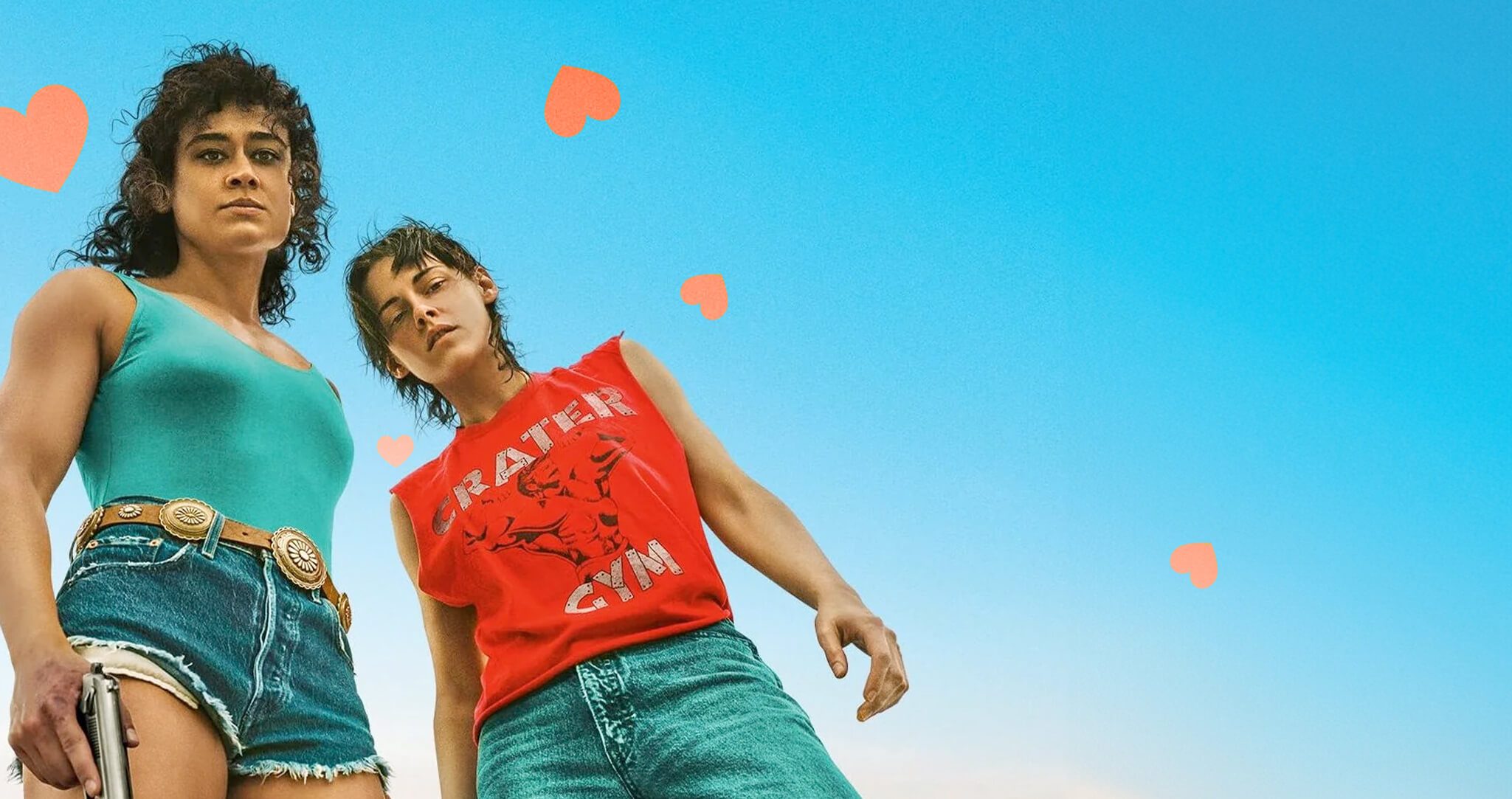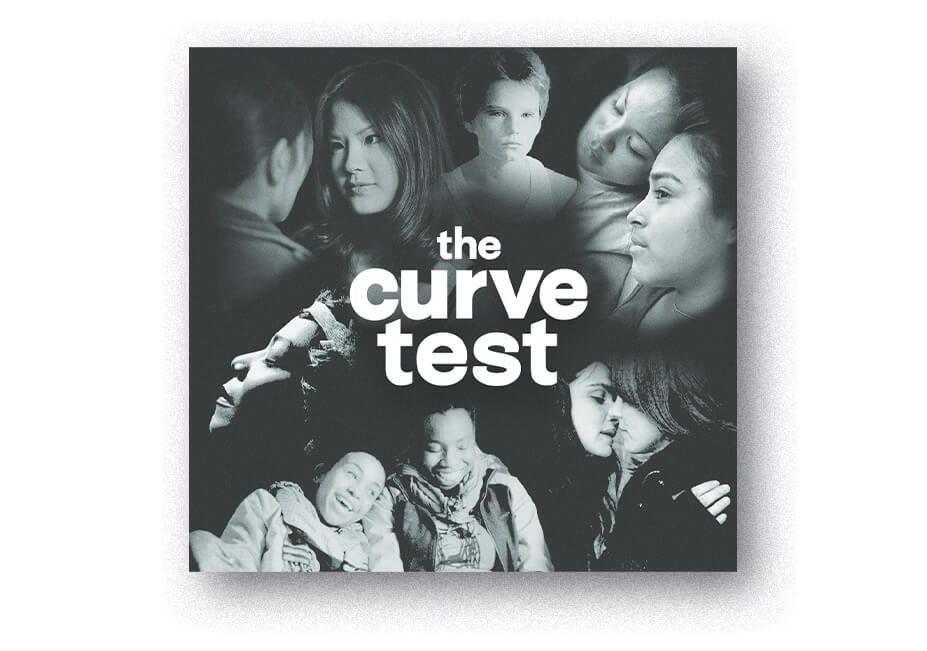
Editor’s note:
Films and series that pass The Curve Test help broaden and deepen representation beyond the stories that reduce LGBTQ+ women, trans, and nonbinary people to stereotypes. Films and series that don’t pass are not to be condemned. Rather, the test is intended as a tool for conversation, a barometer to help us see which films and series are pushing the movement forward and where we need to put more attention. The Curve Test was created to spark discussion, relying on the community to add to the list and comment on what’s already there. This article represents one viewpoint in that discussion as we look at some of the lesbian cinematic highlights of the year.
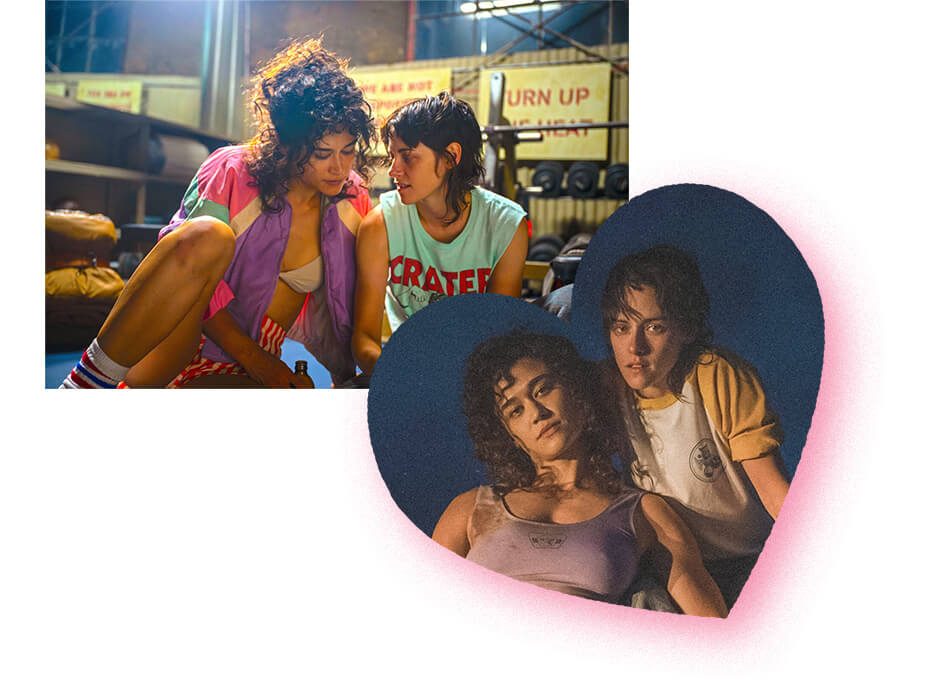
LOVE LIES BLEEDING
LOVE LIES BLEEDING
Equal parts brutal, sexy, and bizarre, Love Lies Bleeding is a sensory thriller ready to entice you and shock you. Lou, played with a captivating uncertainty by out and proud Kristen Stewart, lives a draining, banal life as a gym manager when she meets the determined, muscular, and beautiful Jackie (out and queer Katy M. O’Brian), and the two have an instant spark. In classic lesbian fashion, after one night, Lou and Jackie move in together, and their hot and heavy romance sets the stage for trouble. Lou, wanting to help Jackie pursue her dreams of becoming an award-winning bodybuilder, encourages Jackie to take steroids, which sets off a dangerous chain reaction as Jackie becomes prone to anger and Lou’s crime family reemerges.
The film seems dedicated to showing the beauty and grotesqueness of the human body. Whether glistening in a bodybuilding contest or lying dead, head smashed on the floor, Love Lies Bleeding is an ode to all a body can be.
Fans of Bound who have been looking for a successor to the lesbian noir thriller romance that gets the blood pumping will get some thrill highs from watching Kristen Stewart and Katy O’Brien’s frenetic, hungry performances as their love story blossoms into chaos. But Love Lies Bleeding is not interested in being straightforward, narrative or stylistic. The twistiness of the plot and some vague character backstory is to be expected, but director Rose Glass makes the experience visceral and strange. If you are open to the grime, the violence, and plenty of surrealist imagery, Love Lies Bleeding will be a rewarding experience to watch one of the most unconventional cases of lesbian heroes riding off into the sunset.
In my opinion, Love Lies Bleeding clearly passes the Curve Test. It’s certainly more than just a coming out story. Although some audiences may feel that the film leans into the stereotype of lesbian as monster, I feel the characters are nuanced and well-developed. And with its queer cast, it qualifies for a gold star.
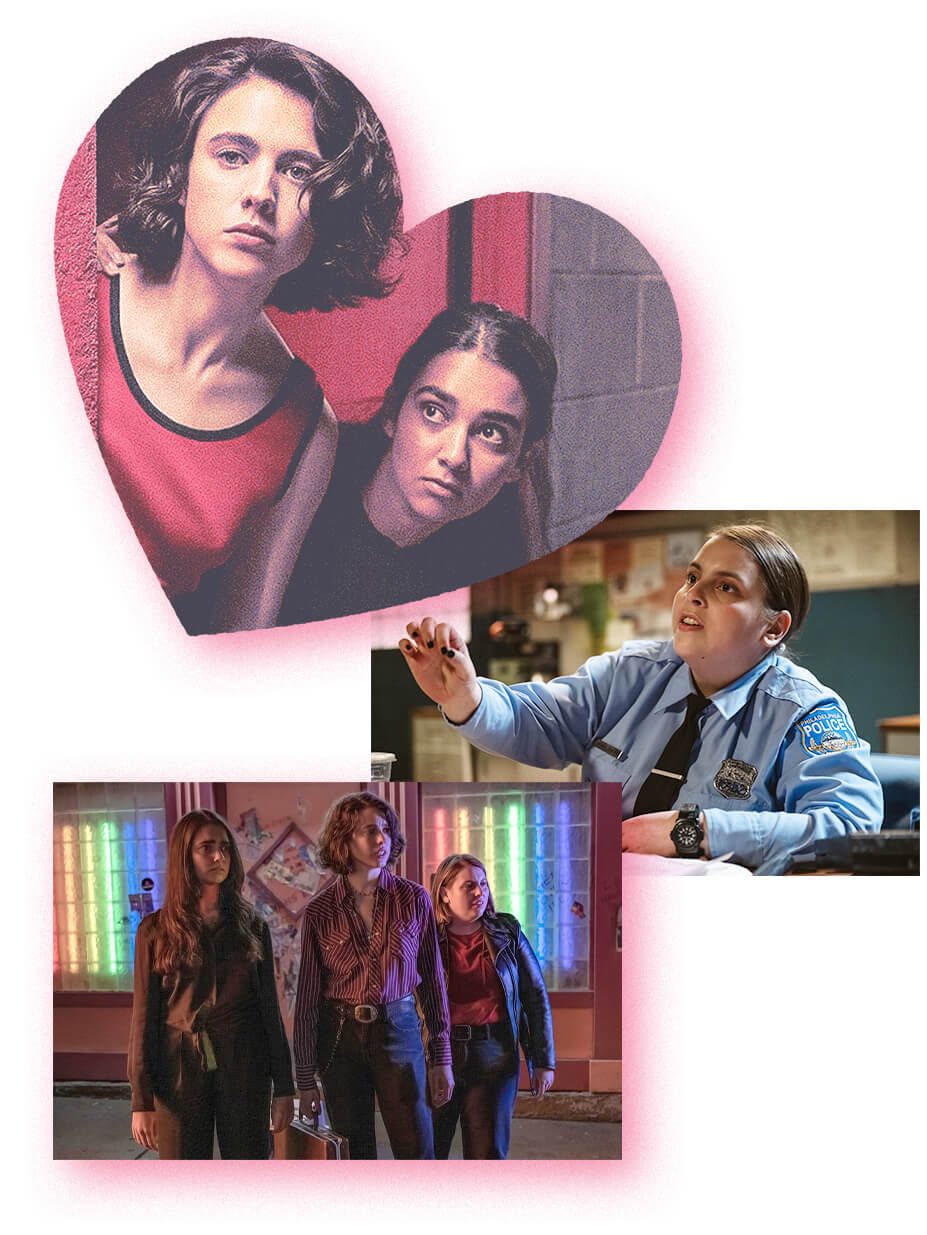
DRIVE AWAY DOLLS
DRIVE AWAY DOLLS
Drive Away Dolls is part road trip adventure, part crime caper, and part sex comedy and when you put it all together, it is a giant mess.
Confident lothario Jamie and uptight Marian are best friends who decide to take an impromptu road trip to Tallahassee, Florida, visiting every lesbian bar in the south along the way. But when it turns out the car they rent has some mysterious contraband, a pair of goons who want that contraband chase after them, inciting a cross-country manhunt.
Perhaps the most polarizing lesbian film among queer women released this year, Drive Away Dolls has earned the love of many queer women who adore its frivolity, constant lesbian makeout/sex scenes, and focus on vibes over story. But those same things also make the experience frustrating, especially with a Coen brother name attached to it.
Though nominally directed by Ethan Coen, he co-wrote and co-directed with his wife Tricia Cooke, who is openly queer. Cooke may give the film some lesbian street cred, but the film’s politics about lesbians sometimes skirt into confusing territory (for example, the movie is obsessed with dildos).
Margaret Qualley and Geraldine Viswanathan do their best with surprisingly unfunny material, but supporting performer Beanie Feldstein (who is queer) is a particular comedic standout. It’s the type of film you not only have to turn your brain off to enjoy, but you also have to remove your brain from your head entirely, put it away in a freezer for a bit, and then after the film you can let it warm up in your head again as you process what the hell you just watched. Irreverent, raunchy, and stuffed with lesbians, yes, but with no true danger in how inept the main criminals are, humor that consistently falls flat, a lack of joy in the friendship between Jamie and Marian, and constant bizarre visual filler despite an 84-minute runtime, Drive Away Dolls appeals to the most puerile parts of ourselves. That is certainly perfect for many audiences who just want the lesbians to mindlessly win in the end, but the next great lesbian comedy, Drive Away Dolls is not. It does not fully pass the Curve Test.
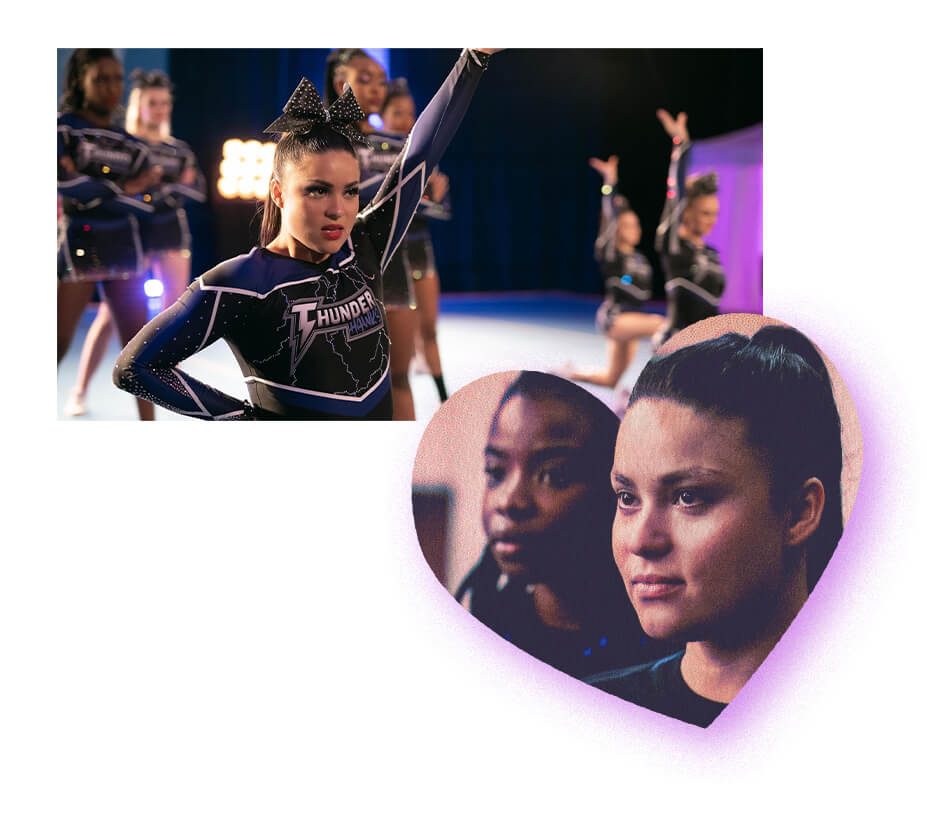
BACKSPOT
BACKSPOT
An energetic, fast-paced sports film about achievement, Backspot is a classically structured sports story grounded by an excellent lead performance by queer First Nations actress Devery Jacobs and a stellar supporting performance by bisexual Evan Rachel Wood.
Ambitious cheerleader Riley, played with beautiful intensity by Jacobs, gets a chance to join the Thunderhawks, an all-star competition squad, but her new role puts strain on her home life and relationship with her girlfriend, especially as the expectations of her new ruthless head coach Eileen McNamara amplify her anxiety.
With some flashy, stomach-turning sequences displaying the athleticism of cheerleading, Backspot is a straightforward sports film about the will to succeed that doesn’t try to break form within the genre. But what makes Riley’s journey unique as an athlete is her relationship with her coaches, McNamara and Devon, who she finds out are both gay. Riley is particularly in hesitant awe of McNamara, played with fierce sturdiness by Wood. Though often cold-hearted and fixated on the win, McNamara understands Riley just a bit more than she lets on, a gay coach trying to offer protection to a gay student while keeping her at arm’s length. Indeed, Riley being queer is an integral part of her character, whether it’s with the playfulness with her loyal girlfriend Amanda or the added pressures she feels pile up on her that her coaches can pinpoint more easily.
Though a sports film, the plot is not particularly concerned with whether Thunderhawks will win the big competition. Instead, the true stakes are about how much weight we put on young people to succeed, yet make it look easy. This contradiction makes Riley’s brisk meteoric rise onto the team all the more high stakes, and Jacobs delivers a keen performance that lets us see into the pressure she feels without tumbling into obvious tropes about athletes being pushed too far. It’s the moments she lets herself be young and joyful that make the successes all the sweeter and are the real triumph of watching her rise.
Backspot passes the Curve Test due to its lead performance by queer Indigenous Jacobs, and a fierce portrayal of a multidimensional gay coach by bisexual actress Wood.

MY OLD ASS
MY OLD ASS
A coming-of-age comedy with a sentimental heart, My Old Ass is a laugh-inducing and tear-jerking experience that will appeal to teens and the teenager within us all. 18-year-old Elliot (queer actress Maisy Stella) is about to leave her small-town cranberry farm for college in Toronto and has one last summer at home she wants to spend with friends and hooking up with the latest girl she’s crushing on. But when she takes shrooms one night, she comes into contact with her 39-year-old self (bisexual actress Aubrey Plaza), who offers the younger Elliot advice not all of which Elliot will take.
Before going further, it’s worth mentioning that within the first few seconds of the movie it’s established that Elliot is gay, however, the main conflict of the movie is her having a crush on and falling in love with a man.
If you are open to this type of ‘discovering your sexuality’ narrative, My Old Ass is a funny, heartwarming experience that will activate the part of yourself that agonizes over whether you’re spending enough time with your family and cherishing each moment like you should. Maisy Stella and Aubrey Plaza certainly do not look, sound, or act like the same person 21 years apart, but their chemistry is undeniable. Stella’s energetic curiosity and Plaza’s downbeat deadpan perfectly butt up against each other as they each navigate having access to their past or future self. Though the romance storyline in My Old Ass takes up the most emotional real estate, it’s Elliot’s family that you want to know more of a charming mix of wholesome, small-town personalities who Elliot learns to appreciate.
My Old Ass passes the Curve Test and does not tread into “lesbian just needed to meet the right man” territory. It takes care to acknowledge that Elliot is not discovering she is straight, but rather she may be bi or pan, and at 18 years old, her sexuality is not the only thing she’s overly confident about at the start of the film. Plus, older Elliot talks about being with both men and women early on (why younger Elliot doesn’t think to clarify that with older Elliot when she first mentions it, who knows). However, you are ultimately expected to root for a lesbian falling in love with a man, and I know that despite the ways that the film sidesteps that trope, it might feel a little icky to some queer women.
What movies have you seen that should take The Curve Test? Submit them here.
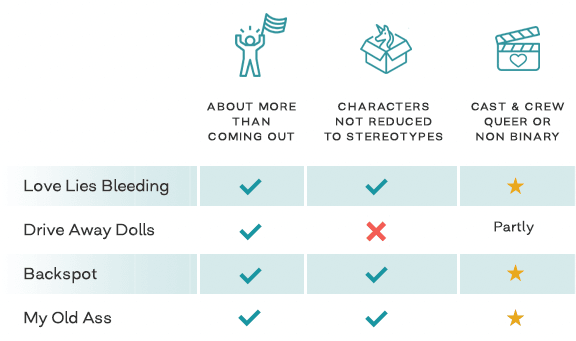
ABOUT THE AUTHOR
Aria Velz (she/her) is a theater director and producer based in the Washington DC area with a passion for lesbian media. She has a combined 220k followers on TikTok and Instagram, where she highlights and analyzes film, TV, theatre, and other forms of media about queer women with hopes they can find the right audience. Follow @AriaVelz

